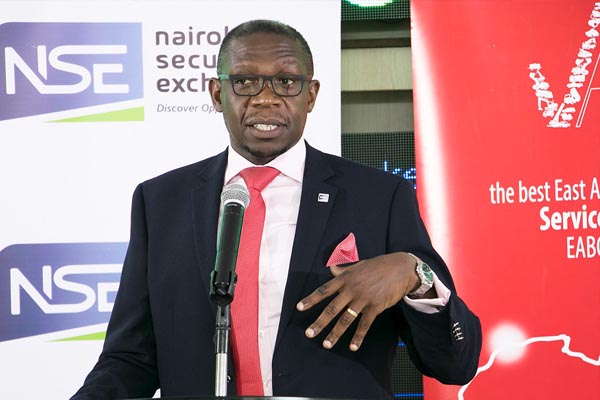#25
NSE
The Nairobi Securities Exchange (NSE) is the leading securities exchange in East and Central Africa with a heritage that spans more than six decades. Founded in 1954, the NSE offers investors a wide range of investment products, including equities, bonds, Exchange Traded Funds (ETFs), Real Estate Investment Trusts (REITs) and derivatives.
There are 65 listed companies on the NSE today representing a diverse range of sectors and industries. These include East Africa’s largest and most profitable corporates, including the likes of Safaricom, EABL, KCB and Equity Bank, which together comprise the most actively traded stocks on the NSE.
Leveraging equities and bonds
The importance of the NSE to Kenya’s long-term economic growth cannot be overstated. Besides encouraging savings and investments, it also provides an avenue for companies and the government to access cost-effective capital through equities and bonds.
Companies looking for capital to expand and innovate can, with the help of the NSE, offer shares to the public through an initial public offering (IPO), issue new shares if they are already listed on the bourse, or issue a corporate bond to raise debt financing.
While the public is generally more aware of the equities market than the bond market, the latter is just as important to the vibrancy of the capital markets and stability of the overall economy. The NSE provides a secondary market for government and corporate bonds, giving much needed liquidity for debt investors who want to trade their bonds before the maturity date. Without the NSE’s trading platform, many investors would turn away from bonds as they are long-term debt instruments. This would be catastrophic for both corporates and the government as it would make bonds illiquid and unattractive and consequently limit the ability of corporates and the government to raise debt financing.

Examples of companies that have leveraged on the NSE’s world-class securities trading platform to raise capital through equity financing include Safaricom, which raised more than Sh50 billion in its 2008 IPO that offered 25 per cent of the firm to the public. Similarly, companies like EABL have tapped into the corporate bond market in recent years to raise debt financing. The leading brewer and distiller in 2021 listed its Sh11 billion 5-year bond on the NSE. The bond was oversubscribed by more than 3 times, the firm said in a statement. EABL joins Family Bank in the corporate bond market. The lender in 2021 listed its corporate bond. It managed to raise Sh4.42 billion against a target of Sh3 billion.
A decade of transformation
The NSE has enjoyed its most successful decade yet. The last 10 years have been transformative for the bourse and investors. NSE’s total stock market capitalization (total value of listed shares) stood at Sh2.59 trillion in 2021, the Economic Survey 2022 shows. By contrast, market capitalization stood at Sh1.27 trillion in 2012, according to data from the Capital Markets Authority (CMA). This means that, on average, investor wealth in Kenya’s stock market has doubled in the last 10 years.
The bond market has also been growing robustly in recent years in line with the government’s appetite for borrowing and the revival of the corporate bond market. The NSE bond market in 2021 had a turnover of Sh956.97 billion, a 38.3 per cent jump from Sh691.83 billion in 2020, data from the CMA shows.
The NSE’s transformation is the result of an intentional effort to revamp the brand, invest in technology and diversify the product portfolio – all of which have contributed to renewed investor confidence.
In 2014, a year after relocating its headquarters from the Nairobi CBD to its current address at the Exchange Building in Westlands, the NSE took the bold step of undertaking an IPO and self-listing. This made it the second exchange in Africa to demutualize and list its shares after the Johannesburg Stock Exchange (JSE). Demutualization is the process where a mutual company owned by its members converts into a company owned by shareholders.
The NSE managed to raise to Sh4.8 billion through its IPO, a recording an overwhelming subscription rate of 763 per cent. The process not only availed affordable capital to fund growth and expansion, but also revamped the brand and instilled greater confidence among investors.
The NSE has in the years following its IPO leveraged on its strong balance sheet to invest in technology and diversify its product portfolio. A few highlights worth mentioning include the recent launch of day trading in Kenya. Day trading refers to the practice of buying and selling a security within a single day or trading session or multiple times over the course of the day.
Kenya was the first frontier market to launch day trading as part of NSE’s strategy to enhance market liquidity following approval from the Capital Markets Authority (CMA). Day trading helps improve equity turnover and is vital in increasing market liquidity, a key driver of strong long-term stock market performance. Day trading also attracts more sophisticated investors.

The NSE has also launched products such as REITS and ETFs in the past five years. REITs are regulated investments vehicles that enable companies to pool investors’ funds for the purpose of investing in real estate, enabling investors who buy REITs to tap into the real estate market through a liquid product that they can sell if they need their money or the risk reward assessment of the underlying real estate investment changes. ETFs are listed investments products that track the performance of a basket of shares, bonds, or commodities.
An ETF can also track a single commodity such as oil or a precious metal like gold. In 2017, the NSE launched and listed the first ETF, the Barclays New Gold ETF which is also listed on JSE.
NSE’s product diversification has enabled it to get admitted as a full member of the World Federation of Exchanges (WFE), joining an elite cadre of Exchanges such as the New York Stock Exchange (NYSE) and the London Stock Exchange (LSE).
















